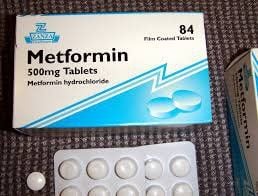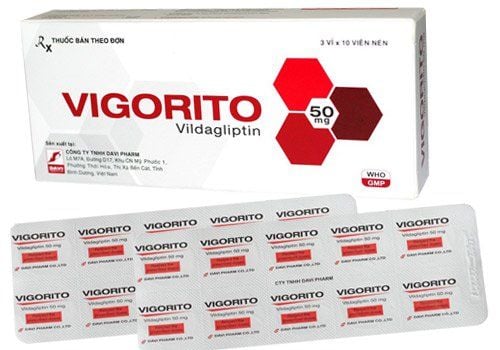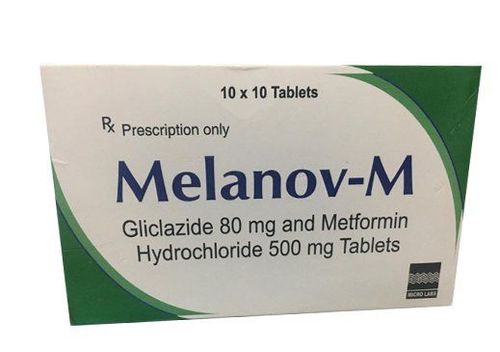This is an automatically translated article.
Glucovance 500mg/5mg is made in the form of tablets, with the main ingredients being Metformin and Glibenclamide. The drug is indicated for use in the treatment of type 2 diabetes, in combination with a suitable diet and exercise regimen to stabilize blood sugar for patients.
1. Uses of Glucovance 500mg/5mg
Glucovance medicine 500mg/5mg contains 500mg Metformin and 5mg Glibenclamide. Metformin is a biguanide, which has antihyperglycemic effects, reducing basal and postprandial plasma glucose. Metformin does not stimulate insulin secretion, so it does not cause hypoglycemia. Glibenclamide is a 2nd generation sulfonylurea that causes acute hypoglycemia by stimulating insulin release in the pancreas.
Combining Metformin with Glibenclamid helps to complement each other's effects. Glibenclamide stimulates the pancreas to secrete insulin, Metformin reduces the resistance of cells to insulin. From there, the drug gives a more comprehensive effect.
Indications for use of Glucovance 500mg/5mg: Treatment of type 2 diabetes in adults:
Used in second-line treatment, when diet, exercise and first-line therapy with Metformin or Glibenclamide have not been effective. desired glycemic control results; Used to replace previous combination regimens with Metformin and Glibenclamide in patients with stable, well-controlled blood sugar. Contraindications to using Glucovance 500mg/5mg:
Patients with type 1 diabetes, diabetic pre-coma; People who are allergic to Metformin, Glibenclamide, other sulfonylureas, sulfonamides or other excipients of the drug; Patients with acute metabolic acidosis; Patients with severe renal failure (glomerular filtration rate eGFR < 30ml/min/1.73m2); Acute cases causing changes in kidney function: Shock, severe infection, dehydration; Diseases that can cause tissue hypoxia such as: Respiratory failure, decompensated heart failure, shock, recent myocardial infarction; Patients with alcoholism, liver failure, acute alcohol intoxication; People with disorders of porphyrin metabolism; Breastfeeding mothers; Combined with the drug miconazole.
2. Usage and dosage of Glucovance 500mg/5mg
How to use: Orally, take the drug with 1 cup of filtered water. The patient should take the drug at mealtime, adjust the number of times of taking the drug according to the patient's eating habits. If Glucovance is co-administered with a bile acid binder, Glucovance 500mg/5mg should be administered at least 4 hours before the bile acid binder to avoid the risk of reduced absorption.
Dosage:
Adults with normal renal function: The starting dose is 1 tablet of Glucovance 500mg/2.5mg or Glucovance 500mg/5mg x 1 time/day. To avoid the risk of hypoglycaemia, the starting dose should not exceed the daily dose of Metformin or Glibenclamide previously taken. Thereafter, the dose should be adjusted every 2 weeks or so, in increments of no more than 1 tablet (depending on blood glucose test results). The maximum daily dose is 2000mg Metformin hydrochloride/20mg Glibenclamide; Patients with Renal Impairment: Renal function should be assessed prior to initiating metformin-containing therapy, then periodically. Metformin dose reduction may be considered depending on renal impairment in patients with an eGFR 50 - 89 ml/min/1.73 m2. Glucovance can be used in patients with an eGFR 30 - 59ml/min/1.73m2 (in the absence of risk of lactic acidosis) and according to an adjustment of the maximum daily dose of 1000mg Metformin hydrochloride/10mg Glibenclamide; Elderly: Dosage of Glucovance should be adjusted based on renal function. It is recommended to start with Glucovance 500mg/2.5mg. In patients 65 years of age and older, the initial and maintenance doses of Glibenclamide should be carefully adjusted to reduce the risk of hypoglycemia. It is advisable to start with the lowest available dose, gradually increasing the dose if necessary; Children: Do not use Glucovance in children. Overdose: When using Glucovance drug in excess, the patient may develop lactic acidosis. The treatment is hemodialysis to remove lactate and Metformin. Glibenclamide, on the other hand, is highly protein bound and cannot be removed by dialysis.
Missed dose: If you miss a dose of Glucovance 500mg/5mg, the patient should add it as soon as he remembers. If it is almost time for your next dose, skip the missed dose and take your next dose as scheduled.
3. Side effects of Glucovance 500mg/5mg
When using Glucovance 500mg/5mg, patients may experience some side effects such as:
Common: Taste disturbance; Uncommon: Mild or moderate increases in serum creatinine and urea levels, episodes of hepatic porphyria, porphyria manifested in the skin. When experiencing side effects of Glucovance, the patient should stop taking the drug and immediately notify the doctor or go to the nearest hospital for the earliest treatment.
4. Be careful when using Glucovance 500mg/5mg
Some notes patients should remember before and while using Glucovance:
If lactic acidosis is suspected related to Metformin, it is recommended to stop taking Glucovance, quickly take the patient to the hospital and perform the procedure. appropriate remedial measures. Hemodialysis should be prompt to correct the acidosis, remove the accumulated Metformin in the body; Before starting Glucovance 500mg/5mg, the estimated glomerular filtration rate (eGFR) should be measured in the patient. Do not initiate treatment in patients with eGFR 30 - 44ml/min/1.73m2. In patients who are using Glucovance and whose eGFR falls below 45ml/min/1.73m2, the benefit/risk assessment should be assessed before continuing the treatment regimen; The risk of metformin-associated lactic acidosis increases with age. Renal function should be assessed more frequently in elderly patients; Discontinue use of Glucovance 500mg/5mg before or at the time of imaging tests using iodinated contrast for patients with eGFR 30-60ml/min/1.73m2, in those with a history of alcoholism , liver failure, heart failure or people who will use intravenous iodinated contrast agents; Discontinue use of Glucovance at the time of surgery with general anesthesia, spinal anesthesia or epidural anesthesia; Acute myocardial infarction, cardiovascular collapse (shock), sepsis, and diseases associated with hypoxemia have been associated with lactic acidosis, which can cause prerenal azotemia. When these events occur, Glucovance 500mg/5mg should be discontinued; Patients should not drink alcohol when using Glucovance 500mg/5mg; Patients with hepatic impairment may develop metformin-associated lactic acidosis. The use of Glucovance should be avoided in patients with known liver disease; Glucovance 500mg/5mg should only be used if the patient adheres to a regular meal schedule. The amount of carbohydrates in the body needs to be regular (due to the increased risk of hypoglycemia if eaten late, the carbohydrate diet is not balanced or incomplete); Patients with heart failure when taking Glucovance are at risk of cardiac hypoxia and renal failure. In patients with stable chronic heart failure, Glucovance 500mg/5mg can be used with regular monitoring of heart and kidney function; Patients should inform their doctor before using Glucovance if you have a urinary tract infection, flu or respiratory infection; Patients using Glucovance 500mg/5mg should adhere to a reasonable diet with a regular distribution of carbohydrates throughout the day; It is necessary to perform regular tests to monitor diabetes: Blood glucose, HbA1c; Glucovance 500mg/5mg should be used with caution in patients with G6PD deficiency, and a non-sulphonylurea alternative may be considered; The drug Glucovance contains lactose, so it is contraindicated for people with glucose-galactose malabsorption syndrome, lactase deficiency; Patients should be warned about the symptoms of hypoglycemia when taking Glucovance 500mg/5mg, be careful when driving or operating machinery; Tell your doctor if you are pregnant, think you may be pregnant, or plan to become pregnant if your doctor considers you to take Glucovance. During pregnancy, diabetics should be treated with insulin instead of Glucovance. If pregnancy is detected while taking Glucovance 500mg/5mg, the patient should notify the doctor for appropriate adjustment; Glucovance should not be used in nursing mothers.
5. Drug interactions Glucovance 500mg/5mg
Concomitant use of Glucovance 500mg/5mg with other drugs may increase side effects or change the effectiveness of the drug. Some drug interactions of Glucovance include:
Do not combine Glucovance with Miconazole because it will increase the hypoglycemic effect (with manifestations of hypoglycemia or coma); Co-administration of Glucovance 500mg/5mg with beta-blockers is not recommended because beta-blockers mask the symptoms of hypoglycemia. Non-cardiac beta-blockers increase the incidence and severity of hypoglycemia; It is not recommended to use Glucovance 500mg/5mg concomitantly with ACE inhibitors such as captopril, enalapril because it may cause hypoglycaemia; Co-administration of Glucovance with Fluconazole is not recommended because it increases the half-life of the sulfonylurea, leading to manifestations of hypoglycaemia; Co-administration of Glucovance 500mg/5mg with Bosentan is not recommended because of the risk of reducing the hypoglycaemic effect of glibenclamide and increasing the risk of elevation of liver enzymes; Co-administration of Glucovance with bile acid-binding agents is not recommended because it reduces plasma concentrations of glibenclamide, leading to a less effective hypoglycemic effect; Consider when combining Glucovance with Desmopressin because it reduces the anti-diuretic effect of the drug. During the use of Glucovance 500mg/5mg, the patient should follow the doctor's instructions, do not arbitrarily adjust the dose without permission. If experiencing any side effects, the patient should immediately notify the doctor for appropriate intervention, reducing the risk of dangerous incidents, threatening the patient's health.
Follow Vinmec International General Hospital website to get more health, nutrition and beauty information to protect the health of yourself and your loved ones in your family.
Please dial HOTLINE for more information or register for an appointment HERE. Download MyVinmec app to make appointments faster and to manage your bookings easily.













